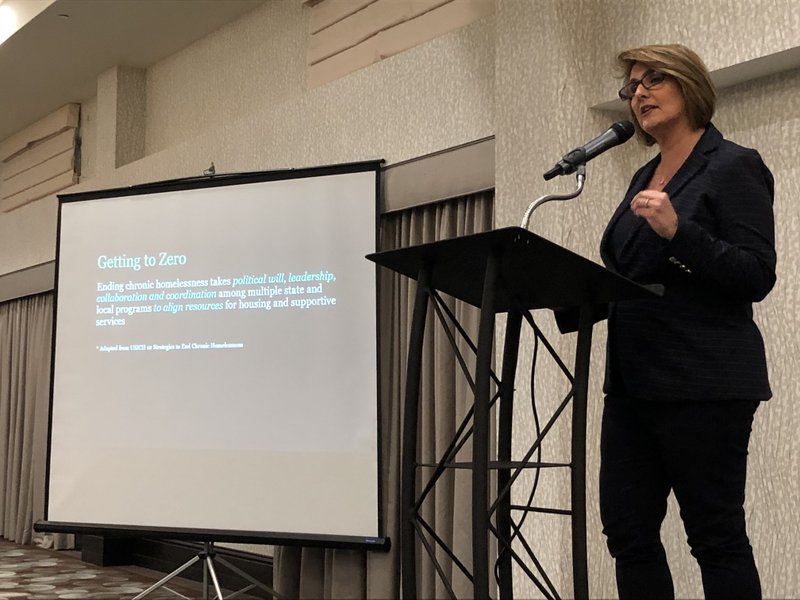FAYETTEVILLE -- Developing partnerships and maintaining accountability is the key to getting help to those who need it most, according to the director of a housing authority whose community was the nation's first to end chronic homelessness.
Northwest Arkansas is on the right path, she said.
Julia Orlando, director of the Bergen County Housing Authority in Hackensack, N.J., addressed a room of about 50 at a Continuum of Care meeting held at the Hilton Garden Inn. The Continuum of Care is the coalition of service providers in Northwest Arkansas seeking to end homelessness.
The Department of Housing and Urban Development recognized Bergen County in 2017 for ending chronic homelessness. Meaning, Orlando said, homelessness in the county is rare, brief and not reoccurring. The county was recognized for effectively ending veteran homelessness the year before, also a first in the nation.
As far as ending veteran homelessness, officials say Northwest Arkansas is not far behind. Steve Burt, executive director of the Continuum of Care, presented the results of the latest point in time count held Jan. 24.
The count revealed 529 residents experiencing homelessness. Of those, 57 were veterans. That number, which breaks down to 28 in transitional housing, 16 in an emergency shelter and 13 unsheltered, matches the continuum's by-name list.
It's a manageable number, Burt said.
"We're going to end veteran homelessness in 2019," he said.
This year's count is higher than the 474 residents experiencing homelessness counted last year. Burt said the increase in the number could be attributed to a variety of reasons -- counting more accurately, more homeless residents taking part or weather conditions that day, for instance.
Perhaps most significantly is the point in time count nearly matches the number of people on the continuum's by-name list, Burt said. Volunteers last year didn't have a functional by-name list to compare to.
"We're in the process of tightening up our data so we can better explain disparities moving forward," he said.
Another function of the meeting was to help the Fayetteville Housing Authority change its priority for giving vouchers. In order to receive federal money, the agency had to hold a meeting addressing the change in policy.
Right now, vouchers are given on a first-come, first-serve basis. There are 480 waiting on the list.
Housing Authority Executive Director Angela Belford, who also serves as chairwoman for the continuum's board, said most likely about 10 percent of the vouchers would go to residents experiencing homelessness. How those residents are selected will need to be reviewed.
"It'll be a several-month process where we'll be working with our board on how we'll change our policies and how we'll change our procedures," she said.
Orlando shared several examples of how Bergen County ended chronic homelessness and maintained functional zero. The county's housing authority, local churches, homelessness services organizations and government leadership banded together, she said.
Orlando described the approach as persistent, coordinated, creative, person-centered outreach. Bergen County also put together a by-name list. Agencies were held accountable for hitting goals, with careful data collected and progress monitored.
Funding sources included federal and philanthropic sources. The county also set up a homelessness trust fund.
Keeping chronic homelessness at functional zero is the hardest part, Orlando said. She said vigilance and keeping track of at-risk residents help keep people from living on the streets.
"It's almost worse than getting to zero because it's like being on that pinnacle, and you don't want to fall," she said.
NW News on 03/07/2019

